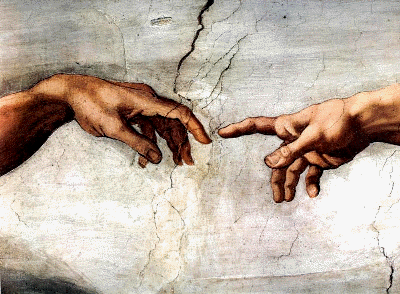It seems like a universe capable of creating itself and time would eliminate the need for a creator, but things are more complicated. Problems revolving around contingency would remain in such a universe. And some theologians have been arguing for ultimate causal answers in response to such problems.
 While a four-dimensional space-time without boundaries may serve as a way for talking about the unfolding of time in the universe without its introduction from somewhere else, it is hard to believe that Hawking’s proposal is not a finite thing which needs further explanation. To be more exact, it seems in need of a divine explanation according to some. Hawking’s philosophical conclusions might then go beyond what his science allows. In his words, “if the universe is really completely self-contained, having no boundary or edge, it would have neither beginning nor end: it would simply be. What place, then, for a creator?”(A Brief History of Time, 140-141). Did the universe really arise from some slight transformation in space from which time arose and in which no meaning is to be found?
While a four-dimensional space-time without boundaries may serve as a way for talking about the unfolding of time in the universe without its introduction from somewhere else, it is hard to believe that Hawking’s proposal is not a finite thing which needs further explanation. To be more exact, it seems in need of a divine explanation according to some. Hawking’s philosophical conclusions might then go beyond what his science allows. In his words, “if the universe is really completely self-contained, having no boundary or edge, it would have neither beginning nor end: it would simply be. What place, then, for a creator?”(A Brief History of Time, 140-141). Did the universe really arise from some slight transformation in space from which time arose and in which no meaning is to be found?
Paul Copan and William Lane Craig (Click the links if you are interested in this proposal. They have lots of material on their websites) have gone as far as arguing God’s transcendence and power to create out of nothing can be proven by investigating science. Their argument relies on a tensed theory of time. If some facts are tensed then so is time. For example, that Charlotte pledged to join a club in 1995 is a tensed fact. It was not true before 1995. So time is tensed and applies to the relation between the world and God. There was once a situation when God existed alone and the universe had not yet been created. Just as Charlotte pledged, God created and there was time before creation with God alone. This defense of a tensed theory of time lets Copan and Craig posit a moment of creation when combined with a rejection of a real infinite past.
Their rejection of a real infinite builds upon three relatively uncontroversial claims. First, physical events refer to changes in the space-time universe. Second, such events have an “earlier than” relation. And third, a beginning in such a scenario would be the first standard event rather than temporal instant. The controversial portion of the debate over creation ex nihilo centers on their claim that “the temporal series of past, physical events is not beginningless” (Creation out of Nothing, 198). To defend this claim they try and show that an actual infinite cannot be instantiated in the real world. An infinite temporal regress of events would be an actual infinite and cannot be real.
 By “instantiated in the real world” they have in mind adding up events to infinity. Obviously nobody can count up from one forever and reach infinity, but the real problem is when mathematical infinite set theory, a well-known fact, is considered in real-world scenarios. For example, take a hotel as an infinite set with its infinity of rooms occupied. Mathematically, if rooms one, two, and three onward to infinity checked out, all rooms would still be full because an infinite set cannot be exhausted. However, if rooms four, five, and six onward to infinity checked out, only three people would be left in the hotel. This is not how the real world works where guests leaving a hotel will open up rooms and matter financially. So an actual infinite cannot exist in the real world. The universe therefore had a finite beginning, and the Big Bang is the best scientific description of that beginning. The Big Bang also begs the question of what caused it and God’s free activity best explains its appearance from nowhere. However, by latching their creation theology onto a tensed theory of events rather than time itself, Copan and Craig have opened the door to a critique which they conveniently ignore. Their argument against an infinite past applies to consistently occurring events, not persistent realities.
By “instantiated in the real world” they have in mind adding up events to infinity. Obviously nobody can count up from one forever and reach infinity, but the real problem is when mathematical infinite set theory, a well-known fact, is considered in real-world scenarios. For example, take a hotel as an infinite set with its infinity of rooms occupied. Mathematically, if rooms one, two, and three onward to infinity checked out, all rooms would still be full because an infinite set cannot be exhausted. However, if rooms four, five, and six onward to infinity checked out, only three people would be left in the hotel. This is not how the real world works where guests leaving a hotel will open up rooms and matter financially. So an actual infinite cannot exist in the real world. The universe therefore had a finite beginning, and the Big Bang is the best scientific description of that beginning. The Big Bang also begs the question of what caused it and God’s free activity best explains its appearance from nowhere. However, by latching their creation theology onto a tensed theory of events rather than time itself, Copan and Craig have opened the door to a critique which they conveniently ignore. Their argument against an infinite past applies to consistently occurring events, not persistent realities.
 If Copan and Craig have missed the mark then their error can be summarized by the way Hawking recounts his 1981 visit to the Vatican. “The participants were granted an audience with the Pope (John Paul II). He told us that it was all right to study the evolution of the universe after the big bang, but we should not inquire into the big bang itself because that was the moment of Creation and therefore the work of God. I was glad then that he did not know the subject of the talk I had just given at the conference – the possibility that space-time was finite but had no boundary, which means that it had no beginning, no moment of Creation” (A Brief History of Time, 166). Note Hawking’s language: there was no moment of creation. Since time did not exist prior to its emergence there was no distinct moment of creation because the four dimensional space-time it emerged from could persist “forever” before time was even real. While Copan and Craig focus on events rather than time, the first event in Hawking’s case can persist continually until time emerges from it. It no longer becomes immediately clear that it begs the question of a creator. I am not sure Copan and Craig avoid Hawking’s critique. What do you think?
If Copan and Craig have missed the mark then their error can be summarized by the way Hawking recounts his 1981 visit to the Vatican. “The participants were granted an audience with the Pope (John Paul II). He told us that it was all right to study the evolution of the universe after the big bang, but we should not inquire into the big bang itself because that was the moment of Creation and therefore the work of God. I was glad then that he did not know the subject of the talk I had just given at the conference – the possibility that space-time was finite but had no boundary, which means that it had no beginning, no moment of Creation” (A Brief History of Time, 166). Note Hawking’s language: there was no moment of creation. Since time did not exist prior to its emergence there was no distinct moment of creation because the four dimensional space-time it emerged from could persist “forever” before time was even real. While Copan and Craig focus on events rather than time, the first event in Hawking’s case can persist continually until time emerges from it. It no longer becomes immediately clear that it begs the question of a creator. I am not sure Copan and Craig avoid Hawking’s critique. What do you think?
For other theologians the issue of contingency in Hawking’s proposal has prompted the revival of different strands within ex nihilo creation theology.
Langdon Gilkey and Mark Worthing have provided a sort of theological two-headed strike against the atheistic conclusions of Hawking. Gilkey’s role was to point out the limitations of science. No matter how much scientists like Hawking want to explain origins, their science will always be confined to talking about finite causes (“The Creationist Issue: A Theologian’s View,” in Cosmology and Theology). Worthing has simply taken this statement and directly applied it to Hawking. Three dimensional space combined with time forms a surface that is without a boundary but still finite in size. That is, Hawking’s proposal has offered one more finite thing, not the explanation for the existence of all things (God, Creation, and Contemporary Physics). In other words, the causal chain in the universe does not stop with Hawking. The way Gilkey sees it, any theory of the “beginning” reached by cosmologists can only involve another thing that could only be explained by the introduction of another thing, and so on forever. In other words, Hawking has perfectly displayed the ontological dependence of all reality on God as far as he is concerned.
Robert John Russell sees such ontological dependence as the core point of the doctrine of creation ex nihilo anyway. This idea does not have to do with wedding a theological affirmation to a specific picture of the Big Bang. If it did, Hawking would indeed appear to be eliminating the necessity of God as a cause. Rather, Russell sees ontological dependence as central: all matter, energy, and everything else that exists depend on God for that existence while God depends on nothing for existence. The ontological question of why something exists rather than nothing is not the same as understanding cosmological causes that only exist in relation to other finite causes. The theological affirmation in Russell’s view of creation has nothing to do with one specific moment before which there was nothing else but God. Rather, every event everywhere is always dependent on God for its existence even if it persisted forever.
 This distinction between ontological and cosmological creation so that theology can support more than one scientific picture of the universe’s origin is an interesting impulse, but becomes rather complex once it is considered in depth. The nuances and problems it raises will be our topic next week, which you can prepare for by reading Gordon Kaufman’s short and very readable In the Beginning…Creativity.
This distinction between ontological and cosmological creation so that theology can support more than one scientific picture of the universe’s origin is an interesting impulse, but becomes rather complex once it is considered in depth. The nuances and problems it raises will be our topic next week, which you can prepare for by reading Gordon Kaufman’s short and very readable In the Beginning…Creativity.












